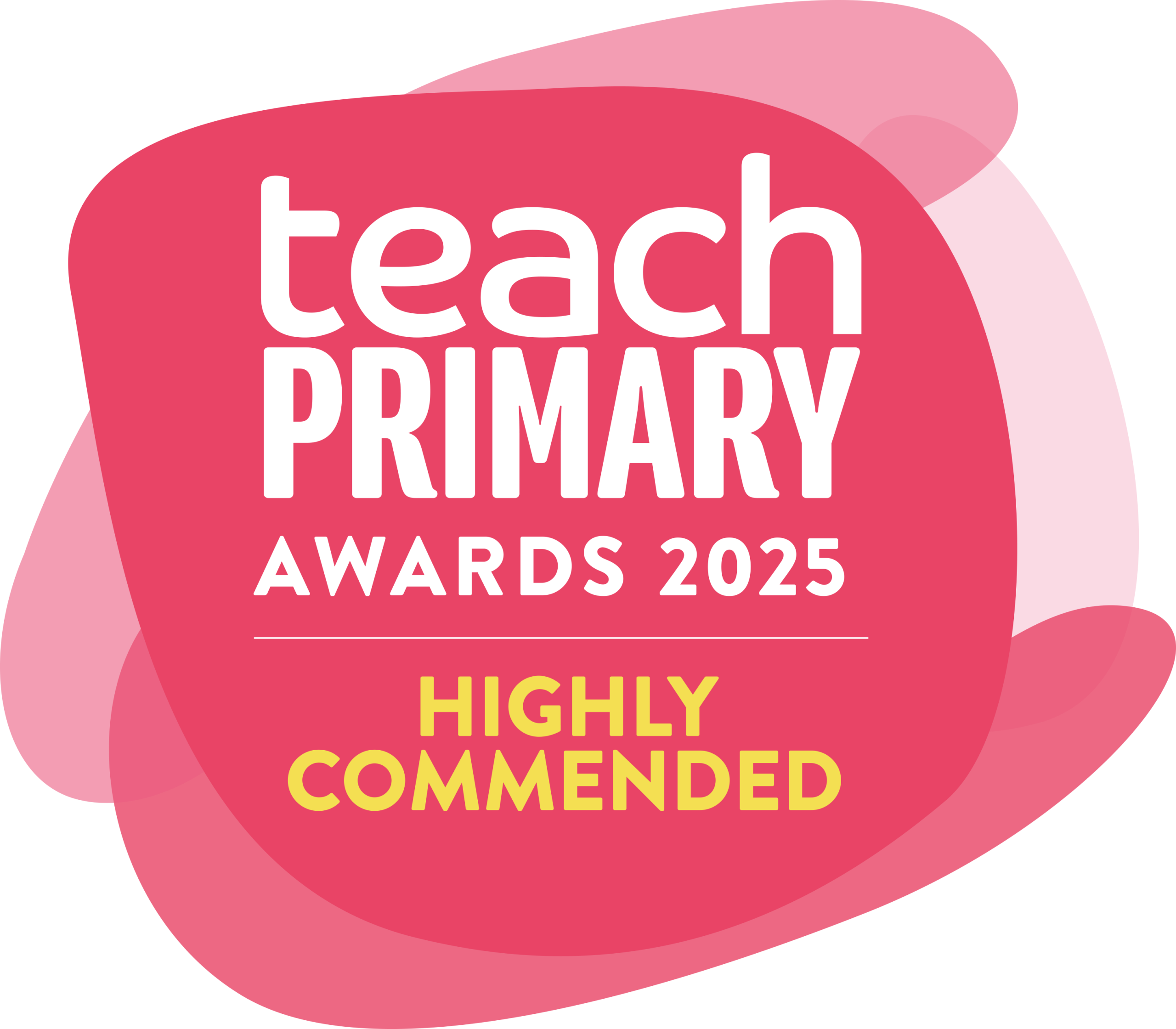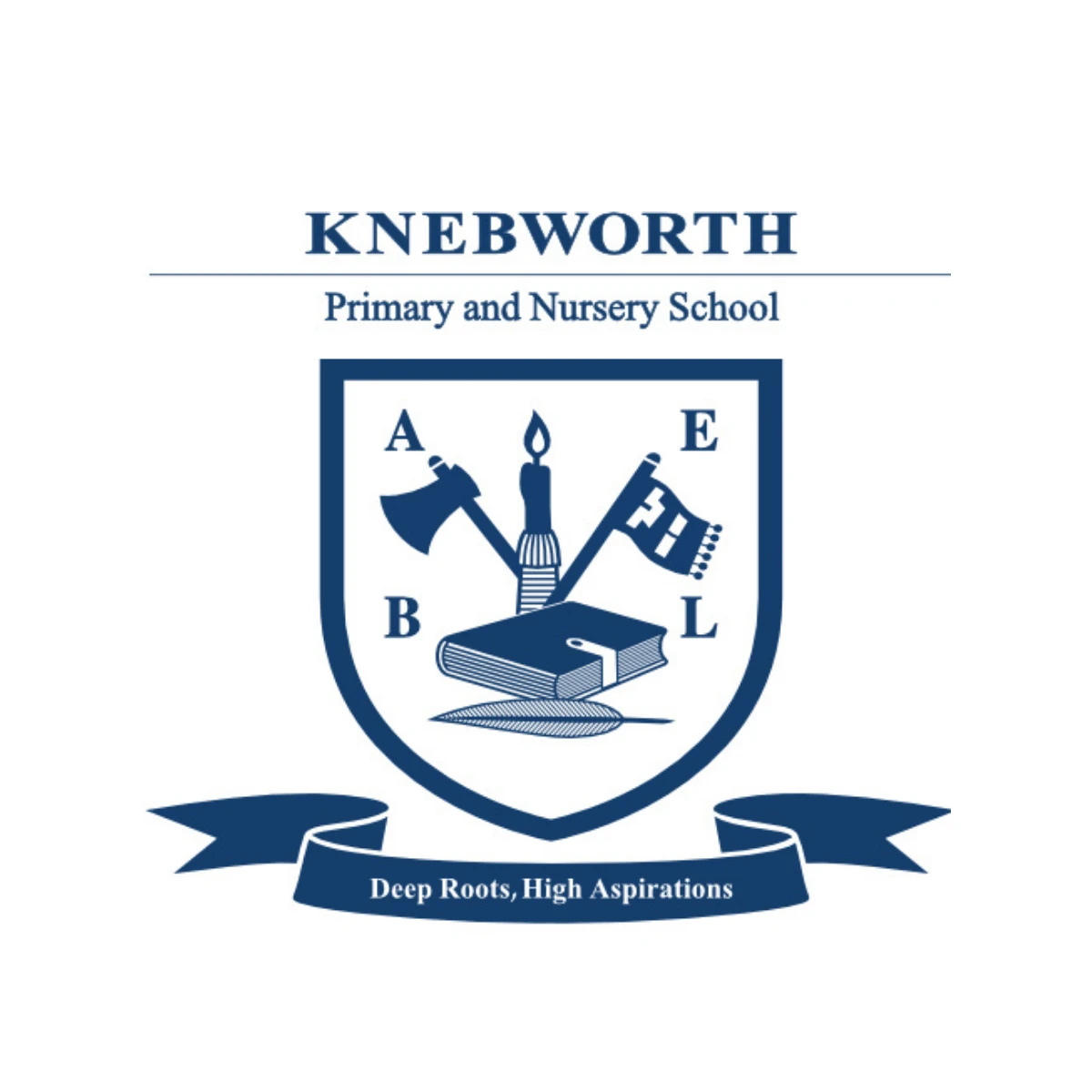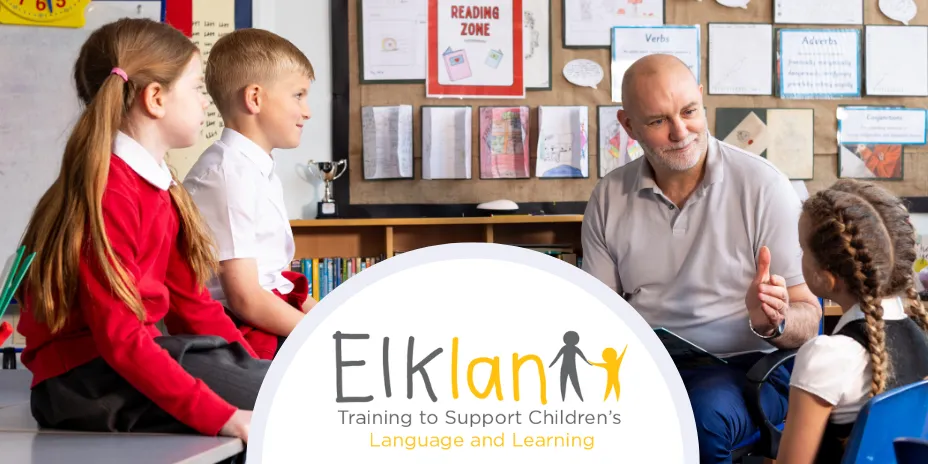Our friendly, knowledgeable team are ready to chat
Call us: 01784 222 300
Apply now: complete application form
GET IN TOUCH

Our friendly, knowledgeable team are ready to chat
Call us: 01784 222 300
Email us: info@esfapprenticeships.co.uk
GET IN TOUCH

For delegates
For employers
What will I gain?
Specialisms
Programme content
How will I learn?
Dates
Eligibility
FAQs
A new progression pathway that opens up opportunities for Teaching Assistants to advance their career and improve student outcomes.
The Level 5 Teaching Assistant apprenticeship is ideal for teaching assistants who have at least one year’s experience in the role.
Be part of the growing number of TAs deepening their skills and knowledge to lead more whole-class activities and broaden their knowledge of both “roaming” support and targeted interventions, under supervision of their classroom teacher or SENCO.
All of our tutors are fully qualified teachers and are passionate about helping teaching assistants develop their careers.
Funding for this apprenticeship
£0
Cost to delegate
£12,000
Funding band for this apprenticeship
What will I gain from this apprenticeship?
- Specialist training in SEND, Social and Emotional wellbeing, literacy or SLCN with training and support from experienced professionals and coaches
- A deep understanding of policies, practices, and procedures relevant to your role
- Specialist knowledge, critical understanding and practical teaching skills to plan, implement, evaluate and adapt activities to advance learning, for example, scaffolding
- The ability to collaborate more effectively with colleagues and other professionals, and support the development of effective practices in team members, for example through mentoring and coaching
- A clear route for career progression, whether you want to advance as a HLTA or go on to become a teacher
Carefully crafted by the experts
This apprenticeship has been co-designed by SEND, literacy, SEMH and communications experts.

Ofsted outstanding apprenticeship delivery from ESF Apprenticeships. All of our tutors are former teachers or SLT members.

SEND expertise from Real Training. This includes ELSA training if you choose the social and emotional wellbeing specialism.
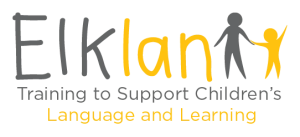
Delegates on the language and literacy specialism can also gain a Level 3 qualification with Elklan, a leading provider of training in speech, language and communication needs.
Specialisms
The SEND specialism
By gaining expertise in supporting and advancing the learning of students with SEND, you’ll ensure full compliance with SEND regulations and implement best practices for inclusive education. You’ll also gain the skills to confidently address diverse learning needs, provide individualised support for students, foster a supportive environment and provide capacity for early identification and intervention for SEND.
The Social & Emotional Wellbeing specialism
[Including ELSA status]
If you choose the Social and Emotional Well-being specialism, you will train under an educational psychologist to become a qualified Emotional Literacy Support Assistant (ELSA). ELSAs play an invaluable role helping children identify, manage and express their emotions.
What if I’m already working as an ELSA? Don’t worry you can still join the programme, read more about the benefits of this strand for existing ELSAs in our FAQs.
The Literacy Curriculum Provision specialism
Learn how to plan, prepare, deliver and evaluate learning and assessment activities and interventions to support individual, small group and whole class literacy learning.
The Language and Literacy specialism
[Including Elklan’s Level 3 qualification in Speech & Language Support for 5-11s or 11-16s]
Learn how to identify and support children with speech, language and communication needs. Further your knowledge and understanding so you can collaborate effectively with Speech and Language Therapists in your role as a specialist TA.

Core programme content
As schools continue to navigate complex educational landscapes, having highly skilled teaching assistants who are equipped to handle SEND, emotional well-being, and curriculum-specific needs will be essential.
1. Regulation & guidance
- Understand the essential regulations, policies, and procedures relevant to your educational settings
- Learn how to maintain the health, safety, and well-being of all learners, with a focus on safeguarding and data protection
- Reflect on the importance of understanding and implementing statutory and non-statutory guidance, promoting a safe and supportive learning environment for everyone
2. Advancing Learning
- Understand the theories of learning and child development, and how they apply to individual learners
- Gain insights on different teaching and assessment methods, and how to use them effectively to advance learning
- Learn how to identify and overcome barriers to learning, and create an inclusive learning environment
- Develop skills in planning, implementing and adapting activities that promote learning and development
3. Planning and Assessment
- Develop a deep understanding of the principles and purposes of assessment, including formative, summative, and individual needs-based assessments
- Learn how to effectively plan and implement assessment strategies to monitor learner progress and inform future teaching
- Gain skills in analysing and interpreting assessment data to identify individual learning needs and adjust instructional approaches accordingly
- Enhance your ability to provide constructive feedback to learners, fostering their growth and development
- Understand the importance of record-keeping and reporting assessment outcomes to relevant stakeholders
4. Professionalism
- Understand the importance of professionalism, ethical behaviour, and maintaining confidentiality
- Develop skills in resilience, adaptability, self-reflection and continuous professional development
- Learn strategies for managing workload and maintaining well-being, recognising the importance of personal capacity
- Embrace feedback and constructive criticism, showing a willingness to learn and grow as a practitioner
- Model ethical, fair, consistent, and impartial behaviours, valuing inclusion, equity, equality, and diversity
5. Communication
- Develop effective communication skills to interact with students, colleagues, and other stakeholders
- Learn how to adapt communication styles to suit different audiences and situations
- Understand the importance of active listening and responding appropriately
- Enhance your ability to provide clear and constructive feedback
- Gain skills in using various communication methods, including verbal, written, and non-verbal communication
SEND Masterclasses
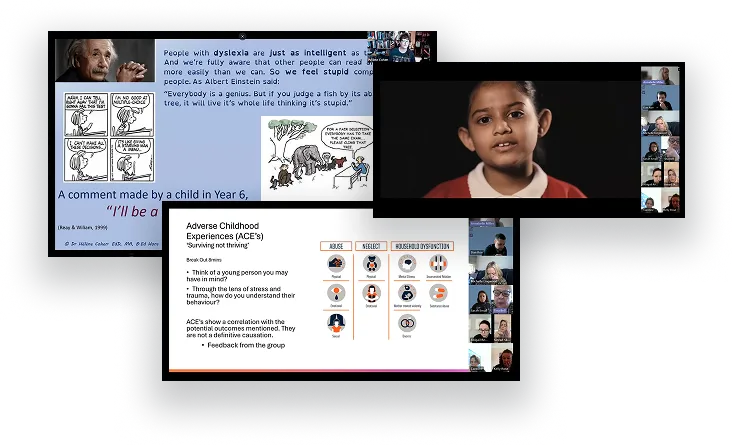
Exclusive invitations to interactive sessions led by an expert in SEND and inclusion.
Benefit from high-impact sessions for schools and nurseries. You’ll be brought up to date in various aspects of SEND and mental health by leading speech and language therapists, dyslexia assessors, educational psychologists, autism specialists and a range of other experts.
- Held every month during term time (attendance optional)
- 2-3 hours presentation and interaction
- Your chance to ask the expert!
- Downloadable resources
- Recordings available on-demand

How will I learn?
The programme runs for 18 months during which time participants will study through a variety of means including:
- Online learning – study flexibly at a time and place that suits you
- Self-directed project work – apply new knowledge and skills through practical projects and research in your setting. Build a portfolio of evidence that will help embed your learning and allow you to have a positive impact from the very start
- Live online tutor sessions – monthly 2 hour sessions led by an experienced teacher, plus follow-up discussions and opportunities to share good practice with other teaching assistants
- Regular progress reviews – with your ESF apprenticeship coach and your mentor to set targets and celebrate successes
NOTE: Mode of study and release time differs slightly if you choose the Social and Emotional Wellbeing specialism or Language and Literacy specialism – please see information on each specialisms in the drop-down above.
Full programme dates will be announced prior to the start of the programme and are available in advance upon request.
Eligibility
- You should have experience working as a Teaching Assistant, Learning Support Assistant (LSA) or equivalent role for at least a year (full-time equivalent).
- If you have completed a Level 3 Teaching Assistant Apprenticeship and are supported by your headteacher you may progress directly to a Level 5 Apprenticeship.
- You must have lived in England for the last three years and have the right to work in the the UK.
- You must be employed at least 16 hours a week and spend at least 50% of your working hours in England over the duration of the apprenticeship.
- Have achieved a minimum of GCSE English at Grade 4 (Grade C) or above, or hold an equivalent Level 2 Functional Skills qualification. This level of English proficiency is required as the apprenticeship is equivalent in academic standard to a foundation degree.
Course start dates
2026 dates
April: Now open for applications
Please note: Spaces are only secured once all forms are submitted and funding has been approved.
Learner FAQs
Who is the Specialist Teaching Assistant Apprenticeship for?
This programme is designed for individuals who support the education of individual learners or groups of learners, working under the supervision of a qualified teacher. It is suitable for those with the following roles (or equivalent):
- Teaching Assistant (TA)
- Learning Support Assistant (LSA)
- Classroom Assistant (CA)
- Education Assistant (EA)
- Classroom Welfare Assistant (CWA)
Participants may come from a wide variety of educational settings including early years settings, primary schools, secondary schools, special schools, alternative provision and further education institutions such as sixth forms and colleges.
How does this training build on existing Teaching Assistant training and experience?
It is not a requirement that you have undertaken any previous Teaching Assistant qualifications.
Whether you have completed our Level 3 Teaching Assistant with SEND training or another Teaching Assistant qualification, this Level 5 programme has been developed to build on skills and knowledge gained from previous qualifications as well as practical experience in your setting.
Whether you’re just starting out in your career or looking to upskill and advance, this apprenticeship provides the perfect next step.
What is the release time required?
We have developed a blended teaching and learning model which works for busy TAs, teachers and school leaders.
Scheduled release time: 2-3 hours every fortnight for live online learning with an experienced teacher, and to gather portfolio evidence. You’ll also have the opportunity to share ideas with other Teaching Assistants from the course.
NOTE: If you choose to study on the Social and Emotional well-being specialist pathway, or Language and Literacy specialism release time is slightly different – see specialism information higher up this page for details.
Full programme dates will be announced prior to the start of the programme and are available in advance upon request.
Flexible release time:
- You will have access to our self-paced online learning platform full of resources, activities, research and ideas.
- You will also complete practical projects that will be carried out in a classroom environment and will be of direct benefit to your pupils and your school.
- You will also need to have release time for regular progress reviews with your ESF tutor and school mentor to set new targets and celebrate success. These are short sessions that will take place every 12 weeks (as a minimum).
- Our SEND Masterclasses are 2-3 hour live online sessions held every month during term time. Attendance is optional and recordings are also available.
Can HLTA status be attained?
All specialisms offer apprentices the option to gain HLTA status.
The knowledge, skills and behaviours on this apprenticeship match closely to the HLTA standards. There will not be any additional learning to complete for those choosing to take advantage of this opportunity to gain HLTA status.
You would need to:
- Demonstrate the ability to deliver to a full class when a teacher is not present and need to complete an additional assessment at the end of your apprenticeship.
- Submit your portfolio of evidence completed as part of the apprenticeship.
- Submit the report you receive as part of End Point Assessment Feedback.
There would be a small additional cost (in the region of £350).
Are ELSA and Elklan qualifications available with all specialisms?
Unfortunately, not. If you would like to achieve ELSA status, you will need to choose the Social and Emotional Wellbeing specialism. If you would like to achieve Elklan’s Level 3 qualification, you will need to choose the Language and Literacy specialism.
I am already an ELSA, can I still join the Social and Emotional Wellbeing specialism?
If you are already a trained ELSA, but wish to continue developing your practical skills in social and emotional well-being, don’t worry – you can still join the programme and choose this specialism.
ELSA training is a core part of the Social and Emotional Wellbeing specialism. This means all participants will need to attend the ELSA sessions. If you’re already qualified as an ELSA, you’ll have the opportunity to refresh your knowledge and practice your skills, whilst developing new expertise offered by the apprenticeship curriculum.
What could I go on to study next?
The Level 5 Teaching Assistant apprenticeship offers a potential progression pathway for those looking to become a teacher, even for learners that do not hold a degree. Following completion of this programme, you may have the opportunity to progress onto becoming a fully qualified teacher and gaining a university degree. We’d be very happy to talk to you about your future career options. Feel free to contact us.
Study this apprenticeship with us
Don’t miss out! Next course start date: April 2026
What our apprentices say
Benefits
Course content
Levy funding
Employer commitments & FAQs
Enable your teaching assistants to specialise in an area of need while helping them develop their career
Benefit from the combined expertise of our Ofsted outstanding apprenticeship delivery, alongside knowledge from Educational Psychologists and other SEND leaders at mental health experts at Real Training.
Our tutors are passionate about helping every TA be the best they can be.
Funding for this apprenticeship
£0
Cost to delegate
£12,000
Funding value for this apprenticeship
£600
Maximum cost for non-levy paying schools
Funding for this apprenticeship
Carefully crafted by the experts
Co-designed by SEND, literacy, communications and apprenticeship delivery experts.

Ofsted outstanding apprenticeship delivery from ESF Apprenticeships. All of our tutors are former teachers or SLT members.

SEND expertise from Real Training. This includes ELSA training if you choose the Social and Emotional Wellbeing specialism.

Delegates on the Language and Literacy specialism can also gain a Level 3 qualification with Elklan, a leading provider of training in speech, language and communication needs.
Specialisms
The SEND specialism
By gaining expertise in supporting and advancing the learning of students with SEND, participants will ensure full compliance with SEND regulations and implement best practices for inclusive education. They’ll also gain the skills to confidently address diverse learning needs, provide individualised support for students, foster a supportive environment and provide capacity for early identification and intervention for SEND.
The social & emotional wellbeing specialism
[Including ELSA status]
If participants choose the Social and Emotional Well-being specialism, they will train under an educational psychologist to become a qualified Emotional Literacy Support Assistant (ELSA). ELSAs play an invaluable role helping children identify, manage and express their emotions
What if my member of staff is already working as an ELSA? Don’t worry they can still join the programme, read more about the benefits of this strand for existing ELSAs in our FAQs.
The literacy curriculum provision specialism
Participants will learn how to plan, prepare, deliver and evaluate learning and assessment activities and interventions to support individual, small group and whole class literacy learning.
The language and literacy specialism
[Including Elklan’s Level 3 qualification in Speech & Language Support for 5-11s or 11-16s]
Participants will learn how to identify and support children with speech, language and communication needs. They will further their knowledge and understanding so they can collaborate effectively with Speech and Language Therapists in their role as a specialist TA.

Core programme content
As schools continue to navigate complex educational landscapes, having highly skilled teaching assistants who are equipped to handle SEND, emotional wellbeing, and curriculum-specific needs will be essential.
1. Regulation & guidance
- Understand the essential regulations, policies, and procedures relevant to your educational settings
- Learn how to maintain the health, safety, and well-being of all learners, with a focus on safeguarding and data protection
- Reflect on the importance of understanding and implementing statutory and non-statutory guidance, promoting a safe and supportive learning environment for everyone
2. Advancing Learning
- Understand the theories of learning and child development, and how they apply to individual learners
- Gain insights on different teaching and assessment methods, and how to use them effectively to advance learning
- Learn how to identify and overcome barriers to learning, and create an inclusive learning environment
- Develop skills in planning, implementing and adapting activities that promote learning and development
3. Planning and Assessment
- Develop a deep understanding of the principles and purposes of assessment, including formative, summative, and individual needs-based assessments
- Learn how to effectively plan and implement assessment strategies to monitor learner progress and inform future teaching
- Gain skills in analysing and interpreting assessment data to identify individual learning needs and adjust instructional approaches accordingly
- Enhance your ability to provide constructive feedback to learners, fostering their growth and development
- Understand the importance of record-keeping and reporting assessment outcomes to relevant stakeholders
4. Professionalism
- Understand the importance of professionalism, ethical behaviour, and maintaining confidentiality
- Develop skills in resilience, adaptability, self-reflection and continuous professional development
- Learn strategies for managing workload and maintaining well-being, recognising the importance of personal capacity
- Embrace feedback and constructive criticism, showing a willingness to learn and grow as a practitioner
- Model ethical, fair, consistent, and impartial behaviours, valuing inclusion, equity, equality, and diversity
5. Communication
- Develop effective communication skills to interact with students, colleagues, and other stakeholders
- Learn how to adapt communication styles to suit different audiences and situations
- Understand the importance of active listening and responding appropriately
- Enhance your ability to provide clear and constructive feedback
- Gain skills in using various communication methods, including verbal, written, and non-verbal communication
Benefits for employers
The benefits of having a Specialist Teaching Assistant in your school are extensive:
- Improved learner outcomes: Benefit from specialist TAs who can effectively support students with diverse needs, leading to better academic and social-emotional outcomes
- Enhanced inclusion: Create a more inclusive learning environment where every student feels supported and able to reach their full potential
- Address specific needs: Tailor training to your school’s requirements by choosing from SEND, Social and Emotional well-being, Literacy or PE, Health and Wellbeing Curriculum specialisms
- Sustainable workforce development: Build a skilled and knowledgeable workforce that can support your school’s long-term goals. This can also foster loyalty and reduce staff turnover
- Cost-effective training: Utilise the Apprenticeship Levy to cover the cost of the programme, making it a budget-friendly option for professional development and an excellent way to upskill staff
- Positive school culture: Promote a culture of continuous learning and improvement, benefiting both staff and students
“The communication-friendly environment that we’ve got in Woodlands class is almost entirely down to Jess and all the learning that she has taken place through this apprenticeship.
The training course has been brilliant for Jess and, as a result of this, I would really consider putting other people through the Level 5 Apprenticeship course. It has moved the whole school forward.”
Levy funding
The Growth and Skills Levy (formerly known as the Apprenticeship Levy) is essentially a fund set up to support the training and development of staff through apprenticeships. Funds are collected and put into a digital account for employers.
- Who pays it? Anyone with an annual wage bill over £3 million.
- How does it benefit your school? The money in this account can be used to pay for apprenticeship training for both your existing staff and any new apprentices you hire. Apprenticeships are available for anyone aged 16 and over, from Level 2 right up to Level 7, covering a wide range of skills.
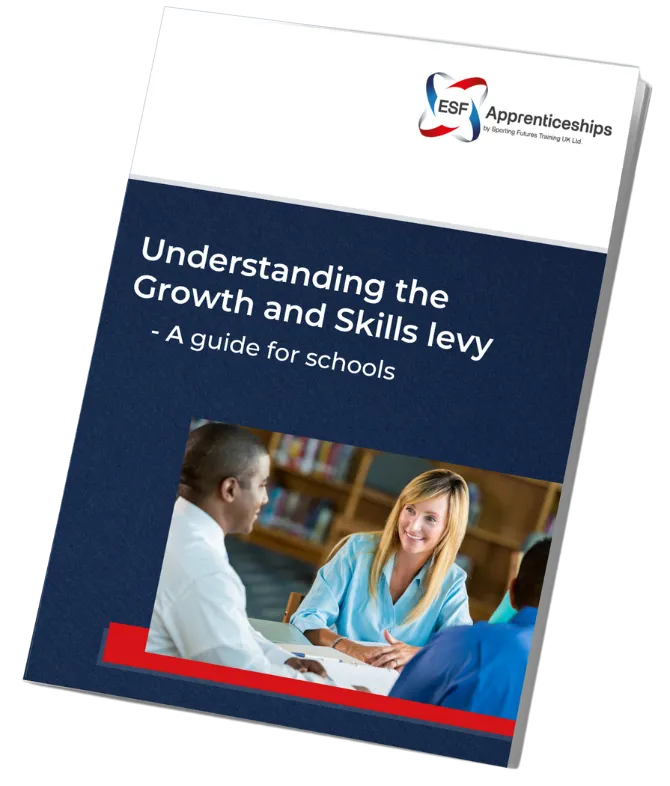

Employer FAQs
How can I access levy funding?
If you pay the Growth and Skills levy (formerly known as the apprenticeship levy), determine who controls the funds, how much you can access, and the steps to get it. Speak to your bursar, business manager, or finance team.
- Local Authority schools can access funding from their council’s shared levy pot, even if their payroll is below the threshold, by contacting the Local Authority’s Apprenticeship Team.
- Multi-academy Trusts with a wage bill over £3m should contact their central finance or HR team.
- Voluntary Controlled schools should approach their Local Authority.
- Voluntary-aided and Foundation schools (non-levy paying) can access 95% government funding, with further support potentially available from the Local Authority or via levy transfer.
What release time is required for this apprenticeship?
We have developed a blended teaching and learning model which works for busy school professionals.
Scheduled release time: 2-3 hours every fortnight for live online learning with an experienced teacher, and to gather portfolio evidence. Delegates will also have the opportunity to share ideas with other Teaching Assistants from the course.
PLEASE NOTE: If delegates choose to study on the Social and Emotional Wellbeing specialist pathway, or Language and Literacy specialism, the required release time is slightly different – see specialism information higher up this page for details.
Flexible release time:
- Learners will have access to our self-paced online learning platform full of resources, activities, research and ideas.
- Learners also complete practical projects that will be carried out in a classroom environment and will be of direct benefit to your pupils and your school.
- They will also need to have release time for regular progress reviews with their ESF tutor and school mentor to set new targets and celebrate success. These are short sessions that will take place every 12 weeks (as a minimum).
- Our SEND Masterclasses are 2-3 hour live online sessions held every month during term time. Attendance is optional and recordings are also available.
What if we don’t pay the levy?
If you don’t pay the Growth and Skills levy then the Government will fund 95% of the apprenticeship and you will need to commit to paying 5% of the fee.
Larger organisations can support other organisations, by making up to 50% of their annual levy funds available to eligible employers who need financial assistance with apprenticeships. ESF Apprenticeships should be able to support your organisation to fund the whole cost of this apprenticeship using another organisation’s unused funds via a process known as Levy Transfer.
We can provide more information if you are interested in pursuing this route.
What are my obligations as an employer?
You’ll need to provide a formal employment contract covering the duration of the apprenticeship.
An apprentice must be paid at least the minimum apprenticeship wage in their first year of learning.
Apprentices aged 19+ must be paid at least the minimum wage for their age group in their second year of learning.
You must assign a school mentor who will participate in termly progress reviews and complete a final “Employer Review” assessing the apprentice’s professional behaviours.
Apprentices will gain experience through hands-on tasks and research projects, with much of this learning occurring in the classroom. Mentors will also need to carry out two observations during the course of the apprenticeship.
Mentors will need to support the end-point assessment process by attending a “gateway meeting” and assisting with planning the assessment day, which typically takes only a few hours.
What about Off-the-Job hours?
Off-the-Job-Training (OTJT) is an essential part of an apprentice’s development. It is dedicated time, during normal working hours, in which apprentices can focus on learning and applying new skills.
This protected time is required for apprentices to engage fully with their learning and development activities. All of the required learning, live workshops and projects completed during the programme count towards Off-the-job time.
Our apprenticeship tutors will sign-post opportunities which count as Off-the-Job Training and during the enrolment meeting we can discuss how this can work alongside busy job roles.
Who from my setting should mentor an apprentice on this course?
You must appoint a workplace mentor for the apprentice. This could be their line manager or other member of the SLT.
Participants will have termly progress reviews in which they’ll celebrate their growth and successes and discuss challenges they have been facing. These will be scheduled with the apprentice, in-school Mentor and Apprenticeship Coach at a time that is convenient for all.
The final progress review is combined with a Gateway Review. Once this has been completed, apprentices will then undertake the End-Point Assessment (EPA).
What if my apprentice needs to study for their Functional Skills qualifications?
For learners aged 16-18 without the necessary GCSEs, additional release time will be needed for Functional Skills qualifications in English and maths.
Apprentices will be fully supported by our experienced tutors.
My staff member is already an ELSA – is the social and emotional wellbeing specialism still appropriate?
If a member of staff is already a trained ELSA, but wishes to continue developing their practical skills in social and emotional well-being, don’t worry – they can still join the programme and choose this specialism.
ELSA training is a core part of the Social and Emotional Wellbeing specialism. This means all participants will need to attend the ELSA sessions. If they are already qualified as an ELSA, they’ll have the opportunity to refresh their knowledge and practice skills, whilst developing new expertise offered by the apprenticeship curriculum.
See all >
Develop your workforce
Complete our short online form and we’ll be in touch to discuss your needs.
Next cohort: April 2026


